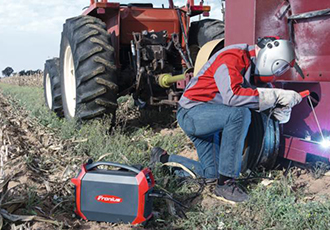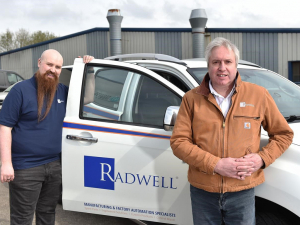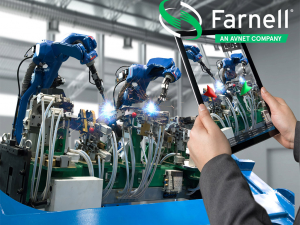The welding challenges of agricultural technology

Tractors, combine harvesters, and seeders are exposed to the effects of wind, weather, and dirt every single day. Damage and wear are therefore a fact of life, with these machines regularly having to be repaired out in the field, a reality that often presents its own challenges. Reliable, portable, and flexible welding systems are an important tool for farmers and agricultural service technicians.
Welding a clean weld seam in a protected environment with a stable power supply is already a task that requires a great deal of practice. Once you add complicating factors into the mix – such as no electricity supply, barely passable terrain, or a more difficult welding task itself – it becomes necessary for welding systems to meet very special criteria before the repair can have any chance of success.
Fronius has several products for just such a scenario, all of which are user friendly, robust, powerful, and portable. The TransSteel, TransPocket, and AccuPocket are just some examples of these systems.
All three power sources are very intuitive to use and promise a stable arc and reproducible welding results thanks to a digital control system. Software updates mean that users can benefit from new or improved welding processes without having to invest in a brand new device.
Protection against spraywater (IP 23 protection class) and a long service life are further benefits of these models. Fronius tests the robustness of its products in endurance tests that are far more stringent than the requirements stipulated in the relevant standards.
The TransPocket and AccuPocket SMAW and TIG devices are ideal for situations where mobility and flexibility are key. The AccuPocket is perfect for mobile use thanks to a weight of just eleven kilos including its lithium-ion battery. When being operated in battery mode, the AccuPocket draws all of the power it needs from its rechargeable battery. A fully charged welding system can weld eight 3.25 mm electrodes or 18 electrodes that are 2.5 mm in diameter.
Hybrid mode means the unit can draw power from both the battery and a secondary electricity supply at the same time, be that from the grid or a generator. The power reserves in the battery compensate for the voltage fluctuations in the electricity supply and prevent the mains fuse from tripping in the event of a power surge.
If desired, power can also be drawn exclusively from the grid. As the AccuPocket’s current consumption is very low, it only needs a smaller – and therefore cheaper – current transformer with two instead of eight kilovolt-amperes.
Where there is no battery available to compensate for the voltage fluctuations, such as with the TransPocket, the Fronius PFC technology (power factor correction) comes into play. PFC technology efficiently uses the available power supply and prevents reactive power, whereby automatic power factor correction models the input current in such a way that it has a virtually perfect sinusoidal wave.
By balancing out voltage fluctuations in this way, the PFC technology can guarantee a stable arc. Such fluctuations can occur in generator-powered operation, for example, for which the single-phase welding systems are designed.
Both power sources are programmed with functions such as SoftStart, HotStart, and anti-stick. These stabilise the arc, facilitate ignition, prevent electrode burn-out, and help the mobile technician to produce high-quality welding results.
For varied welding tasks, multiprocess models such as the TransSteel, which is capable of MIG/MAG, TIG, and SMAW welding, are the perfect choice. A major benefit of single-phase power sources is the wide variety of characteristics that are available, including those for aluminium and copper-silicon alloys.
The TransSteel is also fitted with a second gas solenoid valve, which makes it easier to change from a MIG/MAG process to a TIG process. A second advantage is its user-friendliness – the user can be ready to weld in just three steps: enter the filler metal to be welded, the wire diameter, and the gas being used.
Other special features include the TAC function as well as spot and interval welding. The TAC function has been designed for tack welding and uses a pulsed arc to set the two weld pools in motion so that they merge into one. This function is also useful for welding thin sheets without any filler metal. Spot and interval welding are suitable for joining thin sheets too, as the heat input is lower.
Regardless of the power source you choose, they all have to be brought to where they are actually needed. Fronius not only offers the right tool case for the different models, but also the accessories you need to complete a professional job on site.
Similar articles
More from Fronius Perfect Welding
- The welding challenges of agricultural technology 14th October 2019












Write a comment
No comments